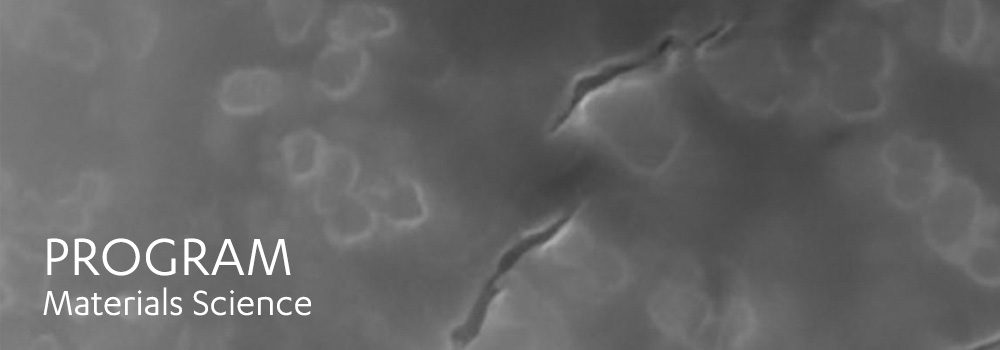
An understanding of the microstructure of solids is at the heart of materials science.
Materials Science
Degree: Master of Science in Engineering – Materials Science
Area Director: Professor Morris Wang – ymwang@ucla.edu
Program Description: An understanding of the microstructure of solids is at the heart of materials science. “Microstructure” is used broadly in reference to solids viewed at the subatomic (electronic) and atomic levels, and the nature of the defects at these levels. The microstructures of solids at various levels, especially the defects, profoundly influence the mechanical, electronic, chemical, and biological properties of solids. The phenomenological and mechanistic relationships between the microstructure and the macroscopic properties of solids are, in essence, what materials science is all about. This is best represented by the “materials science triangle”: synthesis-microstructure-properties.
Materials engineering is concerned with the design, fabrication, and testing of engineering materials. Such materials must simultaneously fulfill dimensional properties, quality control, and economic requirements. Several manufacturing steps may be involved: (1) primary fabrication, such as solidification or vapor deposition of homogeneous or composite materials; (2) secondary fabrication, including shaping and microstructural control by operations such as mechanical working, machining, sintering, joining and heat treatment and (3) testing, which measures the degree of reliability of a processed part, destructively or non-destructively.
Course Requirements: At least nine courses are required (36 Units), of which at least FIVE must be graduate courses at the 200 level (excluding ENGR 299 Capstone Project course), and meet Comprehensive Exam Requirement.
A minimum of (6) courses must be from the MAT SCI Department. Select MECH&AE courses are also eligible (listed below).
- MAT SCI 120 – Physics of Materials
- MAT SCI 122 – Principles of Electronic Materials Processing
- MAT SCI 221 – Science of Electronic Materials
- MAT SCI 223 – Materials Science of Thin Films
- MAT SCI 224 – Deposition Technologies and Their Applications
- MAT SCI 243A -Fracture of Structural Materials
- MAT SCI 250B – Advanced Composite Materials
- MAT SCI 252 – Organic Polymer Electronic Materials
- MAT SCI 270 – Computer Simulations of Materials
- MAT SCI 298 – Nondestructive Evaluation
- MAT SCI 298 – Characterization of Electronic Materials
- MAT SCI 298– Materials Science in Additive Manufacturing
- MECH&AE 166C – Design of Composite Structures
- MECH&AE 256F – Analytical Fracture Mechanics
- MECH&AE C296A – Mechanical Design for Power Transmission
- MECH&AE M297B – Material Processing in Manufacturing
- MECH&AE M297C – Composites Manufacturing
Please visit the Registrar’s webpage for Course Descriptions.
COMPREHENSIVE EXAM REQUIREMENT
Students can meet the Comprehensive Exam Requirement by choosing ONE option below:
Option 1:
Take and Pass ENGR 299 Capstone Project course.
Option 2:
Take and pass three written exams for three different graduate level courses within the student’s area of specialization. The written exams are held concurrently with the final exam of the graduate level courses. Students may select which exams they would like to count towards the Comprehensive Exam requirement.
Electives:
As long as you have met the requirements above, the remaining courses may be selected from other Engineering departments. No approval is necessary. Please note: Students may not apply electives towards earning a certificate. Certificate programs are intended for non-matriculating students and are categorized as separate programs.
Thesis Plan:
NONE
Time-to-Degree:
Students are expected to complete the degree within two academic years and one quarter, including two summer sessions. The maximum time allowed in this program is three academic years (nine quarters), excluding summer sessions.
